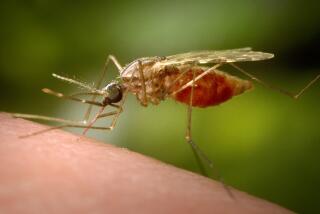Experimental Ebola vaccine draws eager test volunteers
- Share via
Reporting from BALTIMORE — Two years ago, Khandra Sears contracted malaria for the good of science. Two weeks ago, the 33-year-old postdoctoral fellow became a test subject in research to stop another scourge: Ebola.
She was injected with 100 billion particles of a chimpanzee cold virus that had been modified to resemble Ebola. Over the next year, she will give researchers copious amounts of her blood to test for antibodies that could disable the Ebola virus.
On a recent visit, her body just wouldn’t bleed anymore. She couldn’t fill the ninth and final vial researchers sought to fill.
But for Sears and many of the other volunteers, the sacrifice is worth it. She is among 20 research subjects who have received the experimental Ebola vaccine in a study at the University of Maryland School of Medicine in November.
“This was a way I could help,” said Sears, who will receive as much as $1,000 for her participation. “Vaccine development is such an important process to take part in.”
The trial in Baltimore is one of several testing the safety and effectiveness of the vaccine, which is one of many candidates being ushered through clinical trials in hope of ending the Ebola outbreak that has killed more than 5,000 people in three West African countries since December.
The vaccine cannot give the subjects Ebola. It contains proteins that fool the immune system into mistaking the harmless chimpanzee virus for Ebola.
But that doesn’t stop friends and family from being concerned for the volunteers.
Andrea Buchwald, a 28-year-old doctoral student in epidemiology who also received the vaccine, said people she has told have assumed she’s putting herself at risk by participating. As an epidemiologist, she said, she sees her participation as an opportunity to help others learn more about vaccine development.
“I allowed myself to be given this experimental vaccine because I have that much confidence in the process that led up to the development of it,” Buchwald said.
That doesn’t mean the process is painless. As with the flu shot or other inoculations, the Ebola vaccine caused some side effects in some of the participants, said Kirsten Lyke, an associate professor of medicine who is working on the study.
Buchwald said she came down with a fever of nearly 101 degrees hours after the vaccination, and both she and Sears said it left them exhausted.
The researchers gave half the participants a dose containing 10 billion particles and the other half a dose with 10 times as many particles. Buchwald and Sears said they received the higher dose. The method helps researchers learn how much vaccine a patient needs to create immunity, and how long that immunity lasts.
Researchers at the National Institutes of Health, which developed the vaccine along with drug maker GlaxoSmithKline, plan to compare the subjects’ immune response with that of monkeys that were given the vaccine and then exposed to the virus.
Researchers can make inferences based on what they see in the subjects’ blood, but because they are ethically barred from exposing humans to Ebola, they won’t know for sure whether they have developed immunity.
“Unless you have a crystal ball that is well maintained, you can’t really predict how any of these things will perform in humans,” said Nancy Sullivan, chief of the biodefense research section of the NIH’s National Institute of Allergy and Infectious Diseases. “It’s cautious optimism.”
Despite the risks and potential for discomfort for the volunteers, the medical school’s Center for Vaccine Development received an unusually eager response from participants, Lyke said. The study paid a typical rate to test subjects. Buchwald said she received $150 for being vaccinated and will receive $50 each time her blood is drawn.
“Typically, we get one or two people here and there throughout the week, not 120 in three days,” Lyke said. “That was a nice positive response.”
More to Read
Sign up for Essential California
The most important California stories and recommendations in your inbox every morning.
You may occasionally receive promotional content from the Los Angeles Times.













